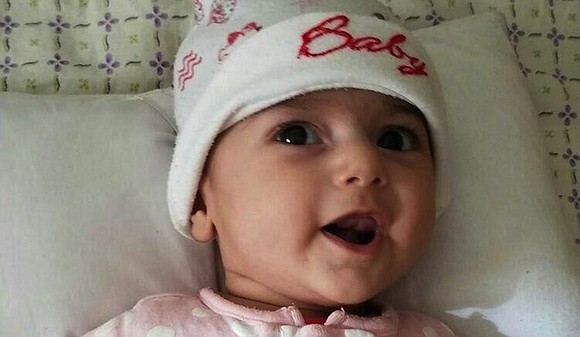Iranian Baby Barred By Travel Ban Arrives at Hospital
CNN/Stylemagazine.com Newswire | 2/8/2017, 9:02 a.m.

By Darran Simon
CNN
(CNN) -- Baby Fatemeh Reshad could soon on the mend -- and just in time.
The 4-month old Iranian infant who has a life-threatening heart defect arrived Tuesday at a Portland, Oregon, hospital, officials there said. Fatemeh and her family had been ensnared in President Donald Trump's immigration ban that barred travel from seven Muslim-majority countries, including Iran.
The baby, who recently received the go ahead to travel to the United States, was undergoing diagnostic tests at Oregon Health & Science University's Doernbecher Children's Hospital. And early results were promising.
"Fatemeh looks well. Our tests this morning have confirmed her diagnosis and the urgent need for treatment," Dr. Laurie Armsby, associate professor of pediatrics and interim head of the hospital's pediatric cardiology division said in a news release.
Oral arguments heard on travel ban
Fatemeh and her family had been scheduled to meet with doctors in Portland on February 5, but Trump's order prevented them from traveling from Tehran, Fatemeh's uncle, Samad Teghizadeh told CNN last week.
The order had barred citizens from the seven countries from entering the US for 90 days, all refugees for 120 days and indefinitely halted refugees from Syria.
Last Friday, a federal judge temporarily stopped the order. Two days later, the Ninth Circuit Court of Appeals in San Francisco denied the US government's emergency request to resume the ban.
The court ordered both sides to submit arguments for and against the ban before a final ruling.
On Tuesday, the Ninth District Circuit Court of Appeals heard oral arguments on whether the travel ban is constitutional.
Worried surgery won't happen in time
Fatemeh became one of the faces of dozens of foreign nationals caught up in the order.
The trip to the United States was essential after doctors in Tehran told her family last month that she has structural abnormalities and two holes in her heart.
The family lacked the resources to treat the infant.
Fatemeh and her parents had boarded a flight to Dubai, United Emirates, but they were rerouted back to Iran and told to apply for a US Visa in 90 days.
Teghizadeh said he was worried his niece wouldn't make it until then. An American citizen for seven years, he lives in Portland with his parents -- Fatemeh's grandparents -- who also are US citizens.
Fatemeh succeeded with help from all corners.
Attorneys contacted the State Department to help the family obtain the waiver to navigate the ban. Fatemeh's family reached out to the office of Sen. Jeff Merkley, D-Oregon.
State and federal officials intervened. Several congressional Democrats from the Oregon, including Merkley, asked Secretary of State Rex Tillerson to grant the waiver for the girl and her parents.
Doctors throughout the United States, Canada and Germany responded to calls for help, Amber Murray, the Washington-based immigration attorney working on the case told CNN last week.
Doctors at OHSU Doernbecher agreed to waive their fees, and the hospital pledged to ensure that most of the surgery was covered.
The International Refugee Assistance Project arranged the family's travel.
'Truly a team effort'
On February 3, New York Gov. Andrew Cuomo said the infant and her family had received the necessary boarding documents to come to the US.
"She has a fairly complicated anatomy with a muscular VSD," Murray said then, referring to a ventricular septal defect.
A ventricular septal defect (VSD) is a common heart defect present at birth due to an abnormal connection between the ventricles or lower chambers of the heart, according to the Mayo Clinic.
Fatemeh's initial diagnosis indicated that she also had other heart complications, including an atrial septal defect -- a "hole" in the wall that separates the top two chambers of the heart.
On Tuesday, the hospital said Fatemeh's heart condition had resulted in injury to her lungs, just as they suspected. But their studies indicated she reached them in time to reverse her condition, the hospital said.
The infant's treatment began with a cardiac catheterization, a procedure that entails inserting a catheter, a long thin tube, into an artery, vein, groin, neck or arm and threading it through the blood vessels to the heart, according to the Mayo Clinic.
"This was truly a team effort to beat the clock, given the medical and legal hurdles Fatemeh was facing," said Jennifer Morrissey, a Portland immigration attorney who worked with Murray and others to bring Fatemeh to the US.
CNN's Dave Alsup contributed to this report.



